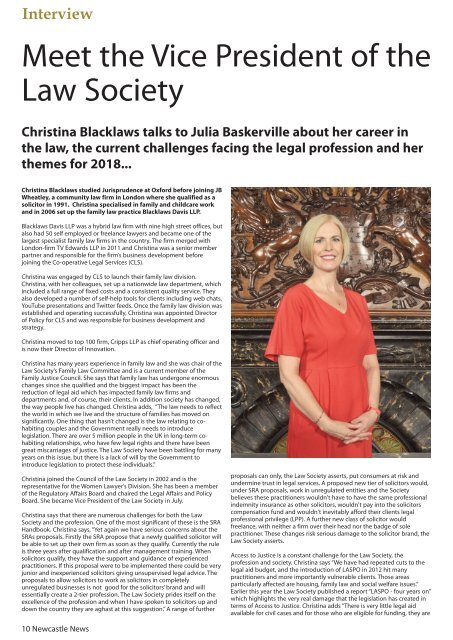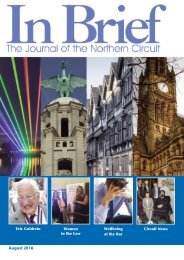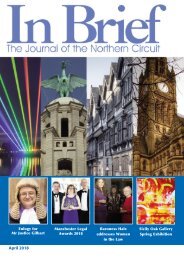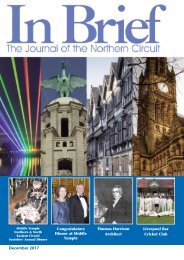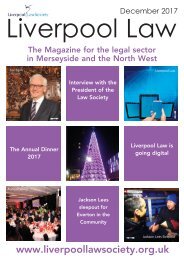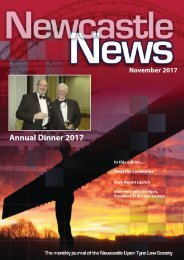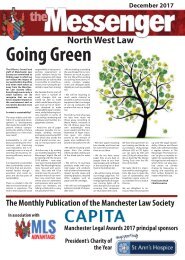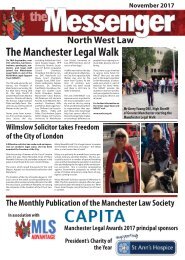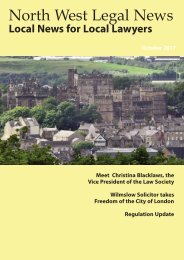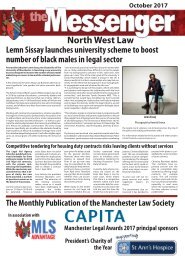Newcastle News Oct 2017
You also want an ePaper? Increase the reach of your titles
YUMPU automatically turns print PDFs into web optimized ePapers that Google loves.
Interview<br />
Meet the Vice President of the<br />
Law Society<br />
Christina Blacklaws talks to Julia Baskerville about her career in<br />
the law, the current challenges facing the legal profession and her<br />
themes for 2018...<br />
Christina Blacklaws studied Jurisprudence at Oxford before joining JB<br />
Wheatley, a community law firm in London where she qualified as a<br />
solicitor in 1991. Christina specialised in family and childcare work<br />
and in 2006 set up the family law practice Blacklaws Davis LLP.<br />
Blacklaws Davis LLP was a hybrid law firm with nine high street offices, but<br />
also had 50 self employed or freelance lawyers and became one of the<br />
largest specialist family law firms in the country. The firm merged with<br />
London-firm TV Edwards LLP in 2011 and Christina was a senior member<br />
partner and responsible for the firm’s business development before<br />
joining the Co-operative Legal Services (CLS).<br />
Christina was engaged by CLS to launch their family law division.<br />
Christina, with her colleagues, set up a nationwide law department, which<br />
included a full range of fixed costs and a consistent quality service. They<br />
also developed a number of self-help tools for clients including web chats,<br />
YouTube presentations and Twitter feeds. Once the family law division was<br />
established and operating successfully, Christina was appointed Director<br />
of Policy for CLS and was responsible for business development and<br />
strategy.<br />
Christina moved to top 100 firm, Cripps LLP as chief operating officer and<br />
is now their Director of Innovation.<br />
Christina has many years experience in family law and she was chair of the<br />
Law Society’s Family Law Committee and is a current member of the<br />
Family Justice Council. She says that family law has undergone enormous<br />
changes since she qualified and the biggest impact has been the<br />
reduction of legal aid which has impacted family law firms and<br />
departments and, of course, their clients. In addition society has changed,<br />
the way people live has changed. Christina adds, “The law needs to reflect<br />
the world in which we live and the structure of families has moved on<br />
significantly. One thing that hasn’t changed is the law relating to cohabiting<br />
couples and the Government really needs to introduce<br />
legislation. There are over 5 million people in the UK in long-term cohabiting<br />
relationships, who have few legal rights and there have been<br />
great miscarriages of justice. The Law Society have been battling for many<br />
years on this issue, but there is a lack of will by the Government to<br />
introduce legislation to protect these individuals.”<br />
Christina joined the Council of the Law Society in 2002 and is the<br />
representative for the Women Lawyer’s Division. She has been a member<br />
of the Regulatory Affairs Board and chaired the Legal Affairs and Policy<br />
Board. She became Vice President of the Law Society in July.<br />
Christina says that there are numerous challenges for both the Law<br />
Society and the profession. One of the most significant of these is the SRA<br />
Handbook. Christina says, “Yet again we have serious concerns about the<br />
SRAs proposals. Firstly the SRA propose that a newly qualified solicitor will<br />
be able to set up their own firm as soon as they qualify. Currently the rule<br />
is three years after qualification and after management training. When<br />
solicitors qualify, they have the support and guidance of experienced<br />
practitioners. If this proposal were to be implemented there could be very<br />
junior and inexperienced solicitors giving unsupervised legal advice. The<br />
proposals to allow solicitors to work as solicitors in completely<br />
unregulated businesses is not good for the solicitors’ brand and will<br />
essentially create a 2-tier profession. The Law Society prides itself on the<br />
excellence of the profession and when I have spoken to solicitors up and<br />
down the country they are aghast at this suggestion.” A range of further<br />
proposals can only, the Law Society asserts, put consumers at risk and<br />
undermine trust in legal services. A proposed new tier of solicitors would,<br />
under SRA proposals, work in unregulated entities and the Society<br />
believes these practitioners wouldn't have to have the same professional<br />
indemnity insurance as other solicitors, wouldn't pay into the solicitors<br />
compensation fund and wouldn't inevitably afford their clients legal<br />
professional privilege (LPP). A further new class of solicitor would<br />
freelance, with neither a firm over their head nor the badge of sole<br />
practitioner. These changes risk serious damage to the solicitor brand, the<br />
Law Society asserts.<br />
Access to Justice is a constant challenge for the Law Society, the<br />
profession and society. Christina says “We have had repeated cuts to the<br />
legal aid budget, and the introduction of LASPO in 2012 hit many<br />
practitioners and more importantly vulnerable clients. Those areas<br />
particularly affected are housing, family law and social welfare issues.”<br />
Earlier this year the Law Society published a report “LASPO - four years on”<br />
which highlights the very real damage that the legislation has created in<br />
terms of Access to Justice. Christina adds “There is very little legal aid<br />
available for civil cases and for those who are eligible for funding, they are<br />
10 <strong>Newcastle</strong> <strong>News</strong>


